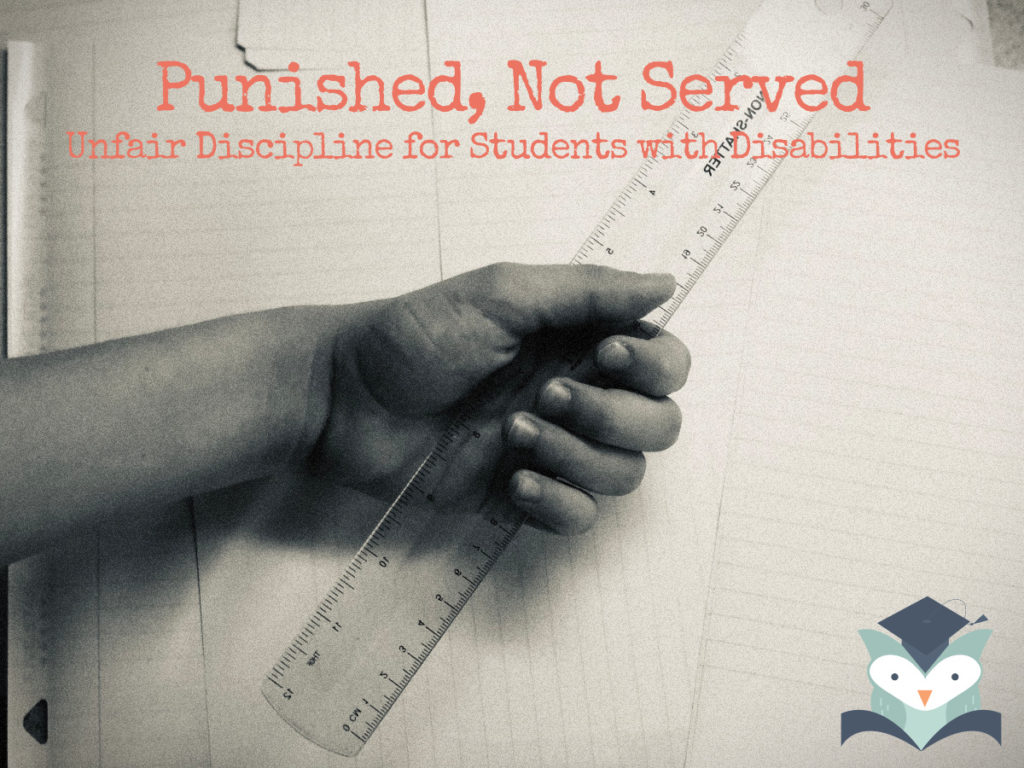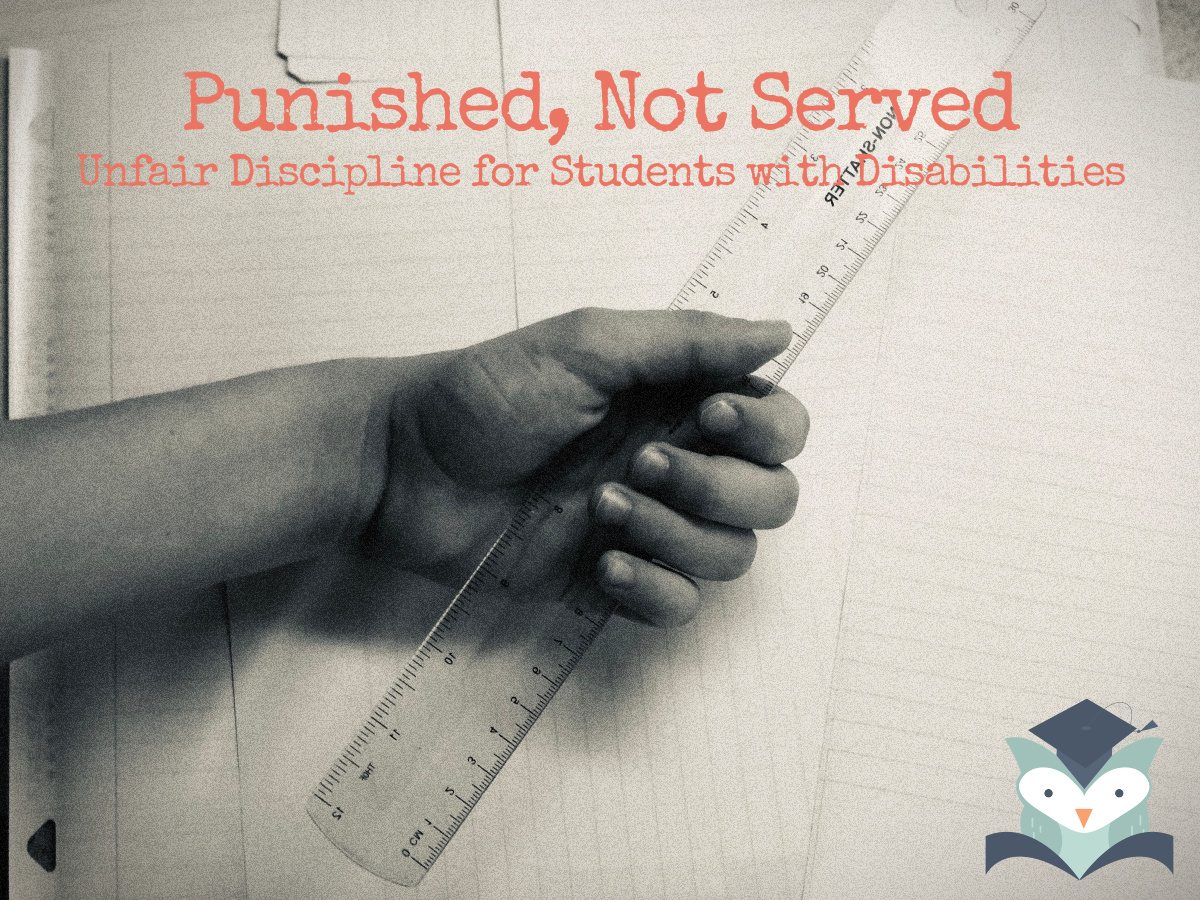Editor’s note: We are featuring the work of guest blogger Bekah McNeel, who writes on our site as Hall Monitor, in a four-part investigative series entitled Punished, Not Served: Unfair Discipline for Students with Disabilities. This is Part IV, the final installment.

Previous installments of the Punished, Not Served series have dealt with statewide data and the long-term struggle of an individual family. However, over 18 months of talking to SPED parents, advocates, and educators, a middle strata emerged something not as glaring as the statewide data, nor as longitudinal as the story of the Terry family. It was something that kept coming up anecdotally, in story after story as SPED parents told of the ups and downs of obtaining services for their children. Toileting. The messy, intimate, visceral business of helping children go to the bathroom at school. The data wasn’t readily available, and there’s little evidence that these things are systematically tracked. But it came up frequently enough that I couldn’t ignore it. This installment is more like an opening statement, a suggestion that there’s more to uncover.
Nobody’s Getting This Right
Sometimes fulfilling an IEP with fidelity feels like going above and beyond. Every disability requires a different kind of support from teachers and administrators. When a disability affects less obvious behaviors, getting school staff on board can be tricky, even when they know the law.
Because SPED services are grouped as “SPED” and not by diagnosis, it can be difficult for parents to know whether a school has a good track record with students like theirs. Complaints and requests for mediation on SPED issues are filed against district and charter schools at roughly the same rate, according to state data from the 2016–17 school year.
Susan Houser with Assessment Intervention Management works with many charter schools trying to develop their special education services. She said she sees an earnest attempt on the part of charters, but offering a full range of SPED services is not without its challenges. Inexperience works against many; she said, “There’s really no way to foresee all of the permutations [of SPED requirements].”
District schools, on the other end of the spectrum, have seen almost everything, but are sometimes mired in bureaucracy as a result of all the policies drafted in response, she explained. In fact, AIM helps many parents navigate the maze of testing, filing reports, and following up with administrators involved with getting students the services they need.
Schools, teachers, and parents are all, in many ways, groping around in the dark when it comes to what is required; Houser said, “Nobody does a really good job of explaining.”
Toileting services graphically illustrate the struggles students with disabilities face when they need to depend on adults who do not understand them.
It’s not uncommon for students with social, emotional, and cognitive disabilities to also have issues related to toileting. Fortunately Medicaid will pay schools for whatever personnel is necessary to help a child in the bathroom. However, SPED advocate Jennifer Fitzhugh, whom we heard from in Part I, Part II, and Part III, claims fraud is common. Districts and charters bill Medicaid for the personal care services they agree to provide as part of the student’s IEP. Over time, those services are not always provided to the extent promised; however, Fitzhugh said, “They will bill Medicaid for doing so three, four, five times a day whether it happens or not.”
Tip of the Iceberg
An open records request revealed three complaints filed with the Texas Education Agency detailing schools’ failure to provide the appropriate toileting accommodations in the 2017–18 school year. That number sounds small, but Fitzhugh suspects it represents the proverbial tip of the iceberg, based on her caseload alone.
Most complaints are dealt with by advocates like Fitzhugh, and, if needed, family lawyers. Complaints can be filed with the school and district. For a complaint to advance to the Texas Education Agency, it usually means the school administrators and district administration have failed to resolve the issue. It’s possible, but not common, for parents to go straight to the state.
Details on one complaint were withheld for FERPA purposes, but the other two explain that when the person responsible for helping the student with their bathroom needs was not available, the assistance was not given. No one else took up the responsibility.
Without required assistance, many students withhold their waste, causing health problems. In one of the complaints filed with the state, the student developed a urinary tract infection. Others have accidents. Adults in the school must then decide who will take responsibility for helping with soiled clothing, hygiene, and emotional upset. Sometimes no one does.
In 2018 Deneatra Terry met with a group of parents attempting to mobilize for SPED advocacy, and she was not the only one with a bathroom-related horror story.
Two other parents among the ten gathered shares stories about teachers who treated their students’ bathroom anxieties or potty training delays as discipline issues, rather than symptoms of a disability—resulting in day-long refusal to change a dirty diaper in one case and, in the other, a urine-soaked roll of toilet paper sent home in the child’s backpack to shame him for his behavior. Like most parents of students with SPED services, they had the documentation to back up their stories.
Toileting and personal care are not the only conditions of the IEP that go unmet, leading to disciplinary action or missed class time.
All in all, many of the behaviors that qualify students for SPED services and make them subject to the protections of the Individuals with Disabilities Education Act are the very ones that get them suspended and expelled. Siloed and haphazard record-keeping within a school, broken lines of communication, differing ideology on the nature of disabilities, and variation in teachers’ classroom management abilities make it too likely that students with disabilities will end up punished rather than served.
This series, Punished, Not Served: Unfair Discipline for Students with Disabilities, has three earlier installments:
- Part I: Texas Data Shows Students with Certain Disabilities Are More Likely to Be Disciplined than Served—Breaking down statewide data to demonstrate how some SPED students are even less likely to be served, and more likely to be punished.
- Part II: Kids Being Disciplined for Their Disabilities—How kids who don’t “fit in the box” could land in alternative school.
- Part III: No One Seems to Want These Kids in Class—The story of a mom who struggled to get a school to meet her son’s needs instead of just sending him home.
